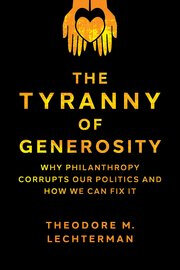The Tyranny of Generosity: Why Philanthropy Corrupts Our Politics and How We Can Fix It
From discussions about philanthropy’s ties to wealth generation and capitalism to its role in perpetuating systems of racial inequality, many important critiques have recently surfaced about the intervention of philanthropic giving in, and its impact on, society. In The Tyranny of Generosity: Why Philanthropy Corrupts Our Politics and How We Can Fix It, Theodore M. Lechterman advances a fresh critique of contemporary philanthropy through an exploration of how it supports, or hinders, the value of democracy. A research fellow at the Institute for Ethics in AI at the University of Oxford, Lechterman draws on political philosophy to thoroughly examine what democracy demands from philanthropic giving and the policies that structure it. The book’s conclusion is that philanthropy and democracy are perhaps intertwined, to the point that the democratic ideal cannot exist without philanthropy, but we must all work to shift philanthropic practice and the laws that shape it so that they support that ideal.
The book’s introductory case study of the Bezos Day One Fund—a $2 billion commitment to address homelessness and preschool education in the United States—is used to showcase how such announcements of mega-philanthropy actually “colonize what are essentially democratic responsibilities.” As the book goes on to show, democracy ensures that goods like affordable housing and education are governed collectively, but donor behavior like that of Bezos undermines the core commitments of a democratic society—“in which people are supposed to determine their common affairs together, on equal terms.”
While the book is centered on the impacts of philanthropy and the policies that frame philanthropic practice, Lechterman explores the value of democracy itself, almost simultaneously proving the ideals of democratic governance alongside the social benefits that philanthropy promises.
[D]emocracy ensures that goods like affordable housing and education are governed collectively, but donor behavior like that of Bezos undermines the core commitments of a democratic society—“in which people are supposed to determine their common affairs together, on equal terms.”
In order to investigate the respective roles of philanthropy and government, Lechterman walks through the roles philanthropy plays in different societies as a result of policy. He discusses the effect of providing public subsidies for private giving, as is done in the United States, and how political institutions enable, circumscribe, and structure the practice of philanthropy. Alternatively, societies that choose to furnish public goods through market exchange, as is the case in Brazil, limit opportunities for philanthropy. These examples show how the political environment results in different benefits and burdens as well as different civic cultures. Lechterman carefully layers on philosophical questions, such as: Under “what conditions, if any, are we justified in using public resources to promote private gift-giving?” He also tackles questions related to the use of donations for political speech.
The book then brings into question the role of political morality on an individual basis. In societies characterized by widespread disparities in wealth, philanthropy may encourage public decisions that are overwhelmingly attuned to the preferences of the rich, no matter how altruistic the intent. The movement for “effective altruism” (in which people who are well-off in global terms are encouraged to give back using an evidence-based strategy) has received its fair share of criticism by those who see this form of giving as mere Band-Aids. Lechterman backs the argument that many have made before: that direct assistance is not as effective as institutional reform strategies and that effective altruists “only address the systems of deeper structural problems.” At the same time, he recognizes that if greater resources flow instead to advocacy by the relatively affluent, it can drown out voices of those closest to the problems and take autonomy away from the community most impacted. Further, Lechterman acknowledges that “the trade-off between relief and reform is an enduring dilemma that confronts nearly every effort at social change,” and that choosing to pursue long-term change isn’t always great news for those in immediate need. To conclude, Lechterman suggests that we move with greater sensitivity to the complexities of this conflict and consider layers of impact and power when justifying intervention strategies.
Businesses are increasingly pursuing social intervention through giving, and a later chapter considers how corporate donations operate within our democracy. Many critiques of this type of giving argue that the concentrated wealth that firms command can have a domineering influence over recipient communities. Pointing out that individuals within a firm are already free to make donations in their individual capacities as citizens, we are encouraged to consider how to make corporate philanthropy and private power work for democracy rather than against it.
Lechterman’s conclusions about philanthropy and democracy flow from systematic arguments illustrated by easily digestible political theory. By looking at the full picture of philanthropy—including the rise in corporate giving, the use of donations for political speech, and questions about giving on an individual scale—he covers the practical ethics of giving itself across all arrangements to show how the whole system of philanthropy is or is not sustaining democracy.
The questions, concerns, and ideas Lechterman lays out in The Tyranny of Generosity should help inform how we think about and structure philanthropy in the contemporary world. It left this reader, however, wondering whether we really can fundamentally shift and sustain forms of both philanthropy and policy that work in conjunction with the ideals of a democratic society. As Lechterman notes, “the value of democracy can’t tell us where to give, but it can tell us how to give more respectfully.” Perhaps that is the best we can do for the time being.
Sarina Dayal is a research specialist at Candid, where they help derive insights about the social sector.






